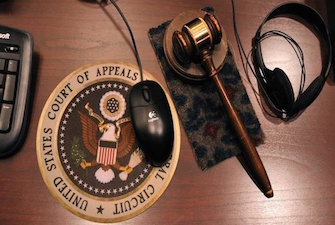“The [CAFC] concluded by stating that all three Cray factors must be met for venue to be proper against a defendant [and] Andra had failed to establish the necessary elements of the second Cray factor.”
 On August 3, the U.S. Court of Appeals for the Federal Circuit (CAFC) affirmed the Eastern District of Texas’ partial grant of Victoria’s Secret Stores LLC, Victoria’s Secret Stores Brand Management Inc, and Victoria’s Secret Direct Brand Management’s (the Defendants) motion to dismiss Andra Group, LP’s (Andra’s) patent infringement suit for improper venue.
On August 3, the U.S. Court of Appeals for the Federal Circuit (CAFC) affirmed the Eastern District of Texas’ partial grant of Victoria’s Secret Stores LLC, Victoria’s Secret Stores Brand Management Inc, and Victoria’s Secret Direct Brand Management’s (the Defendants) motion to dismiss Andra Group, LP’s (Andra’s) patent infringement suit for improper venue.
In April 2019, Andra sued the Defendants for infringement of U.S. Patent No. 8,078,498 (‘498 patent), which claims inventions directed to presenting articles on a webpage. Andra’s infringement claims focus on the victoriassecret.com website, and other functional smartphone applications for using the “master display field,” which the ‘498 patent claims.
Two Years in the Making
The Defendants in the case are all related companies. The defendants include L Brands Inc (LBI), which is the corporate parent of Victoria’s Secret, Victoria’s Secret Stores LLC (Stores), which manages the physical stores, Victoria’s Secret Stores Brand Management LLC (Direct), which operates the victoriassecret.com website, and the Victoria’s Secret mobile application, and Victoria’s Secret Stores Brand Management Inc (Brand), which creates Victoria’s Secret branded apparel and beauty products. All of the defendants are incorporated within Delaware and LBI, Direct, and Brand (Non-Store Defendants) do not have any employees, stores, or any physical presence in the Eastern District of Texas.
Under 28 U.S.C. § 1406(a), the Defendants moved to dismiss the suit for improper venue, or as an alternative, to transfer the lawsuit to the Southern District of Ohio. In response, Andra amended its complaint, but the Defendants filed the motion to dismiss again. The Defendants argued the Stores did not commit the claimed acts of infringement in the store, and the Non-Store Defendants did not have regular and established places of business within the Eastern District of Texas. A magistrate judge suggested that Non-Store Defendants be dismissed for improper venue. The Eastern District of Texas adopted this ruling, and Andra filed a timely notice of appeal of the dismissal of the Non-Store Defendants.
Shifting the Burden and New Requirements
Citing Westech Aerosol Corp. v. 3M Co. (CAFC, 2019), the CAFC recognized that the plaintiff has the burden of establishing that the suit was brought in the proper venue under 28 U.S.C. § 1400(b). Since each of the Defendants are incorporated in Delaware, none of the Defendants “reside” in Texas for purpose of proper venue. Therefore, for Andra to establish proper venue, they must show that each of the Defendants committed the claimed acts of infringement and continues a regular and established place of business in the Eastern District of Texas.
Under the Federal Circuit’s ruling In re Cray Inc. (CAFC, 2017), the court established three requirements to show a defendant has regular and established place of business. The three requirements include “(1) there must be a physical place in the district; (2) it must be a regular and established place of business; and (3) it must be the place of the defendant.” Neither party disputed that the Stores operate within the Eastern District of Texas but argue whether the Stores can be considered “a regular and established place of business” of the Non-Store Defendants.
Andra argued a number of reasons that establish LBI as a regular and established business within the Eastern District of Texas, including that the Stores’ employees are agents of the Non-Store Defendants or, instead, the Non-Store Defendants have sanctioned the Stores’ locations as their place of business. Andra argued LBI maintains the store location workers by controlling store operations, hiring, and conduct. Andra cited an assortment of public filings by LBI related to real estate holdings and investments, said that LBI dictates who is fired and hired within the Stores and that LBI requires the employees of the Stores to sign and follow LBI’s code of conduct. Andra also argued that Direct “controls store location workers by dictating their handling of returns of merchandise purchased on the [Victoria’s Secret] website.” Finally, Andra said that because Brand controls distribution and sale of its products that are exclusively available in some store locations and the website, and since Brand controls the Victoria’s Secret website, this strengthens the agency relationship between the stores and Brand.
Applying In Re Google
Citing In Re Google (CAFC, 2020), where a similar agency question was considered by the CAFC, the CAFC stated none of Andra’s arguments were sufficient to show that the employees of the Stores were agents of the Non-Store Defendants. The public filings that Andra cited demonstrated LBI’s control of the Stores because the cited documents cover all of LBI’s brand, not Victoria’s Secret specifically. The “documents’ use of ‘we’ does not convey that ‘we’ means LBI specifically, but that ‘we’ could include the individual subsidiary brands, like Stores.” Andra’s claim that LBI controls the hiring and firing within the individual stores was directly contradicted by a Store Manager within an Eastern District of Texas store. This testimony also contradicted Andra’s claim that LBI enforced the code of conduct that they required employees to sign. These contradictions that the court cited were sufficient to prove that none of the Stores’ employees are agents of LBI because LBI doesn’t have “the right to direct or control” the Stores’ employees, which is an essential element of an agency relationship under In Re Google.
Additionally, the court found that even though the Stores’ locations accept returns of sales through Direct’s website, which may benefit Direct, Andra didn’t show that Direct controlled this process within the Stores’ locations. The court cited an analogous situation within In Re Google where maintenance of Google’s servers was found insufficient to establish an agency relationship. The CAFC concluded their analysis of Andra’s argument by stating that Brand’s control of products and the website didn’t link to “the right to direct or control” employees at the Stores’ physical locations.
Andra’s Second Argument for Venue
Andra contended that under In Re Cray, the Non-Store Defendants had ratified the retail stores as their own, arguing that: 1) LBI had control over the operations of the retail stores and held out store locations as its own, 2) Direct had ratified store locations by allowing the return of merchandise purchased online and the use of “Find a Store” feature to locate retail stores for customers, and 3) Brand ratified store locations by distributing and selling its merchandise from Store locations and because it is listed as the registrant for Victoria’s Secret’s website. The CAFC found these arguments by Andra to be uncompelling because they had not shown the Non-Store Defendants sustained a “unified business model” with the Stores. The fact that the entities work together was not sufficient to show ratification.
The court concluded by stating that all three Cray factors must be met for venue to be proper against a defendant. Andra had failed to establish the necessary elements of the second Cray factor, according to the CAFC:
Because Andra has not demonstrated that LBI, Brand, or Direct has ‘the right to direct or control’ the actions of Store employees, it has not shown the ‘regular, physical presence of an employee or other agent’ of LBI, Brand, or Direct in the District. The Defendants have also maintained corporate formalities and Andra has not shown that Non-Store Defendants ratified Stores locations in the District as their own places of business.
The court found that since Andra had failed to establish the necessary Cray factors, the district court’s decision was correct and the venue was improper.

![[IPWatchdog Logo]](https://ipwatchdog.com/wp-content/themes/IPWatchdog%20-%202023/assets/images/temp/logo-small@2x.png)

![[[Advertisement]]](https://ipwatchdog.com/wp-content/uploads/2023/01/2021-Patent-Practice-on-Demand-1.png)
![[Advertisement]](https://ipwatchdog.com/wp-content/uploads/2024/04/UnitedLex-May-2-2024-sidebar-700x500-1.jpg)
![[Advertisement]](https://ipwatchdog.com/wp-content/uploads/2024/04/Artificial-Intelligence-2024-REPLAY-sidebar-700x500-corrected.jpg)
![[Advertisement]](https://ipwatchdog.com/wp-content/uploads/2024/04/Patent-Litigation-Masters-2024-sidebar-700x500-1.jpg)

![[Advertisement]](https://ipwatchdog.com/wp-content/uploads/2021/12/WEBINAR-336-x-280-px.png)
![[Advertisement]](https://ipwatchdog.com/wp-content/uploads/2021/12/2021-Patent-Practice-on-Demand-recorded-Feb-2021-336-x-280.jpg)
![[Advertisement]](https://ipwatchdog.com/wp-content/uploads/2021/12/Ad-4-The-Invent-Patent-System™.png)






Join the Discussion
No comments yet.